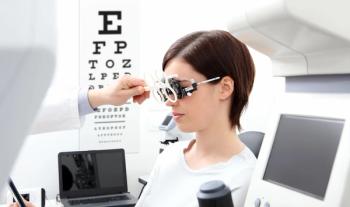
Computer versus traditional
Computerized refraction is growing in popularity.
Key Points
New York-Computerized refraction is growing in popularity, and for good reasons. Speaking at International Vision Expo East, Neil B. Gailmard, OD, MBA, FAAO, explained why.
In many cases, the ease of computerized refraction has led optometrists to train their technicians to perform refractions (under doctor supervision) in states where such an option is permitted. Having technicians perform refraction saves the doctor time, increases the practice's production, and helps develop a staff with higher skill levels.
Dr. Gailmard and his associate optometrists trained 12 clinical technicians on how to perform computerized refraction. The technicians had experience in clinical pretesting but not in refraction. All were trained on his practice's computerized refraction system (Exam 5000, Topcon).
The results that the technicians obtained were compared with results arrived at by Dr. Gailmard or an OD colleague using a traditional mechanical phoropter (Phoroptor, Reichert). The ODs performed refractions on the same patients immediately after the technicians had finished.
Looking at the sphere value of the refraction, 47% (50 eyes) of the 106 eyes had no difference in sphere between the computerized refraction performed by the technician and refraction performed by the optometrist using a phoropter.
Another 41% (43 eyes) had a quarter-diopter difference, for total of 88% of the eyes having a quarter diopter or less difference in sphere power.
Newsletter
Want more insights like this? Subscribe to Optometry Times and get clinical pearls and practice tips delivered straight to your inbox.
















































.png)


